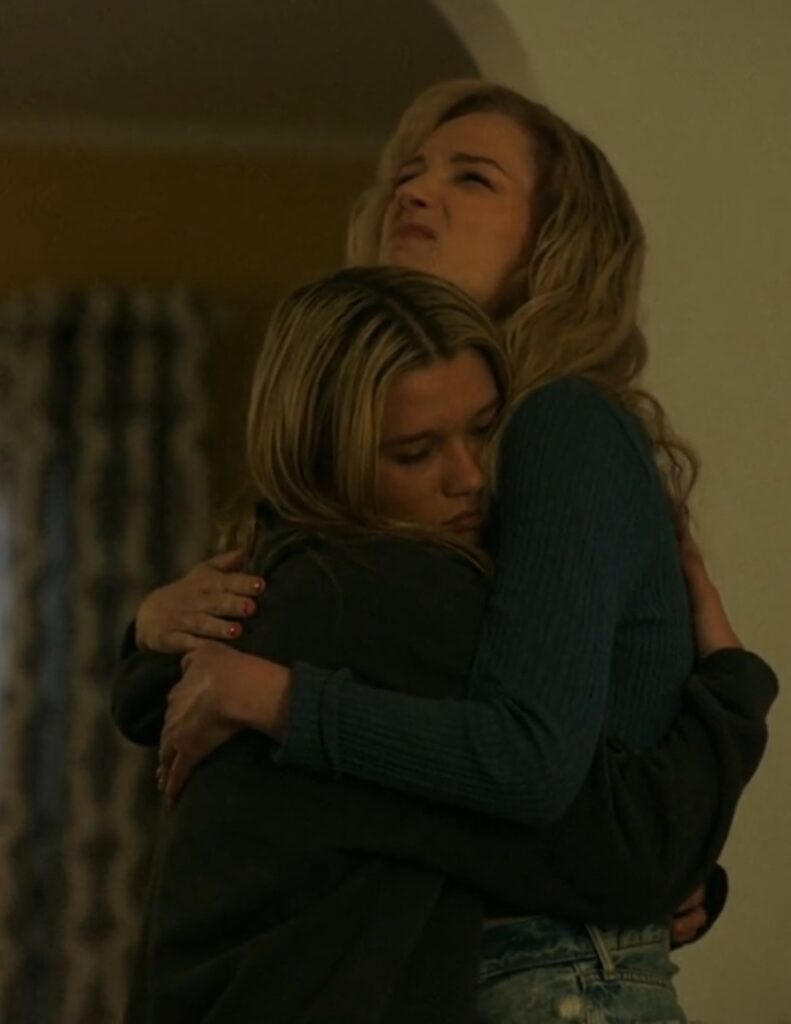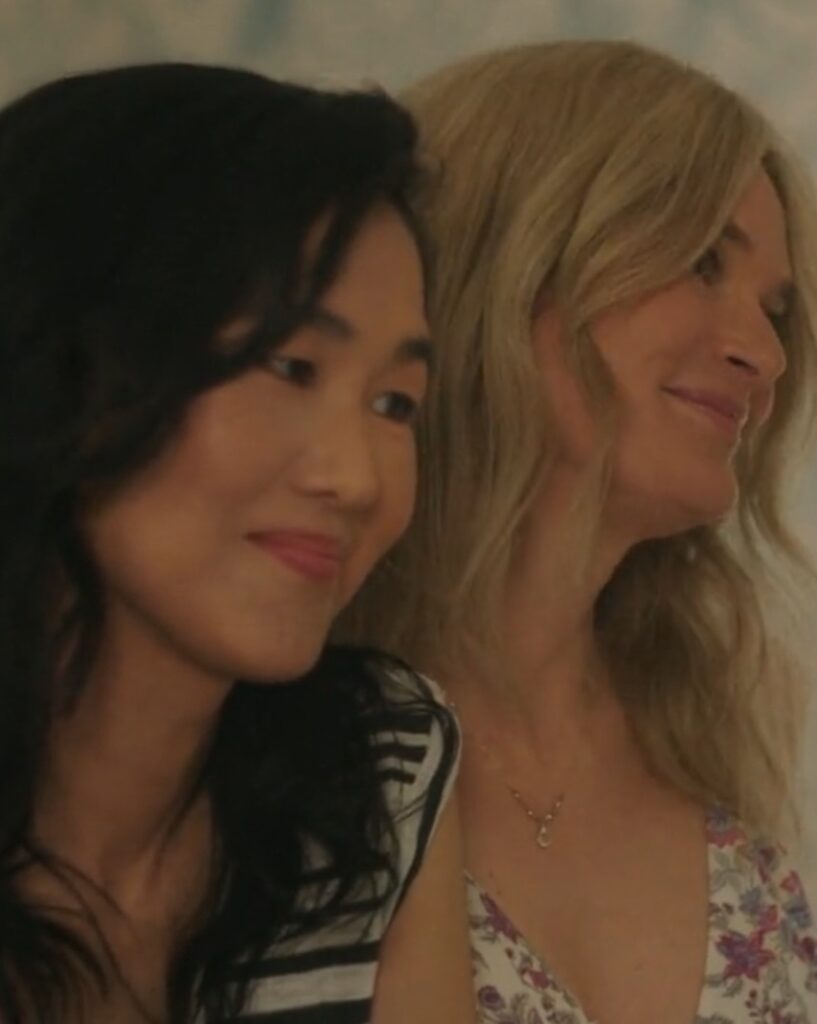Oh, The Summer season I Turned Fairly. What offers?
I perceive that the sequence ideally needs everybody in Cousins on the similar time, however Taylor simply gave up New York Metropolis, Stomach simply gave up Paris, and I’m simply giving up!
I’m kidding on that final level, however holding in thoughts that this season has been an fascinating peek into gendered storytelling, the sequence touches on what quantities to a Ceremony of Passage for Woman and Womanhood — Sacrifice.

TSITP Season 3 Makes use of Taylor as Stomach’s Foil
It’s been a weird season to this point for Stomach’s characterization. For starters, regardless of a time soar, she feels unusually stunted in her development and growth.
The love triangle seems like a query mark, however not for the anticipated causes, and issues have been uneven throughout.
However what’s additionally been fascinating is that the sequence has pushed Taylor ahead with a extra pronounced storyline that just about feels too little too late, or reasonably, too late within the recreation.
Taylor has all the time been a compelling sufficient character, and the tv sequence excels on this regard. In some ways, even her romantic relationship with Steven feels extra grounded and dynamic than the primary romantic plot of the primary trio.
However the last season spending a lot time on Taylor and her endearing however flaky mom feels uncommon and principally pointless — or possibly it’s extra that it seems like a “selection.”
Nonetheless, it has drawn fascinating parallels between Stomach and Taylor — parallels that might’ve been extra worthwhile if the sequence had explored them sooner.

It raises loads of factors about class and privilege. And it additionally, arguably to Stomach’s detriment, offers us a stark distinction in relation to maturity.
What has been bizarre is how this season tends to undercut its personal lead. Stomach feels extra inaccessible and one-dimensional than she has ever been, in a time after we anticipate the alternative from her.
Having Taylor there to distinction with makes the variations between the 2 extra obtrusive.
Taylor’s arc is presumably to arrange her romantic endgame with Steven and discover why she has struggled with making a dedication to him or letting her guard down.
The Parentification of Taylor is on Full Show
What we’ve come to see from Taylor is that she takes on a parental function along with her personal hare-brained mom, who means effectively however is simply usually a sizzling mess.
It’s the traditional (and annoyingly problematic) trope of a working-class single mom who can’t appear to perform on her personal, has a bunch of males, or only a problematic one, flitting out and in of her life, and an exasperated little one — normally a daughter — having to take cost.

Lucinda appears candy and genuinely loves Taylor. You may see that, however she’s additionally the kind of mom who has brought on her little one to develop up too quick and holds her little one again.
Taylor doesn’t get to thrive the best way she needs — and she or he actively is working towards being the anti-Lucinda. Due to Lucinda’s neediness, irresponsibility, and instability, Taylor emerges as an unbiased, jaded younger lady who guards her coronary heart and focuses on different issues.
Taylor takes pleasure in her independence and prefers to deal with issues on her personal, as she doesn’t wish to be like her mom. And it’s noticeable in her method to varsity.
Taylor is the traditional case of a younger lady from a decrease socioeconomic class who is aware of the social hierarchy benefits of sororities. It’s fascinating to see Stomach, who’s been comfortably upper-middle-class her complete life between her circle of relatives and the Fishers, not grasp why Taylor pursued the Greek life.
It permits her to socialize and make connections, opening her as much as potentialities and standing.
The Collection Subtly Shows the Normalization of Sacrifice

However all of Taylor’s work may be for nothing if she as soon as once more steps into the parental function and sacrifices her dream alternative and shot at truly getting forward for the sake of serving to her mom with debt.
It’s the trimmings of household and a cycle of sacrifice mixed with self-sabotage that usually appears ingrained in girls — and it begins at a younger age.
Probably the most irritating factor about watching Taylor’s journey is how relatable her actions are within the second.
As a lot as you wish to shake her for taking an initiative that Lucinda isn’t even asking of her, the truth that it’s such a default response to postpone, postpone, and sacrifice for what one can argue is a “better good” weighs closely.
I need a lot extra for Taylor and located her selection upsetting, however I additionally know that for all my griping, I might’ve possible finished the identical factor. As a result of the fact is that from girlhood to womanhood, we’ve come to glorify the notion of sacrifice.
TSITP Ties Taylor’s Sacrifice with The Aristocracy

In some way, we related it with the Aristocracy.
In actuality, Taylor’s choice to surrender NYC and self-sabotage her personal journey shouldn’t be a lot completely different from Stomach’s choice to surrender Paris of her personal volition underneath the guise of being with Jeremiah.
However what’s fascinating is that Taylor’s selection can simply learn as “noble” due to who she does it for, even when the state of affairs is simply as poisonous.
Taylor’s selection is constructed from a way of maturity, foresight, and accountability. And even when it performs out in her favor in the long run, her willingness to be self-sacrificial is held in some excessive regard.
Subsequently, Stomach falls into the trimmings of self-sabotage and sacrifice, too.
Discovered Behaviors — Is Self-Sacrifice Generational?

It’s meant to align with Laurel’s fears, whereas concurrently prodding at what sorts of sacrifices are worthwhile.
Laurel displays on how marrying younger, having youngsters, and embarking on this life so quickly led to her lacking out on forming her identification.
However these are additionally admirable sacrifices, as she was in love, and she or he raised a beautiful household. In some way, Laurel’s ultimate of sacrifice is just like Taylor’s noble transfer of doing it for household reasonably than Stomach’s actions pushed by codependency, trauma, grief, and worry.
The sequence explores the notion of sacrificing oneself for love, however the impression varies relying on the kind of love.
Both manner, the outcome is similar in that womanhood is routinely related to that of sacrifice.
From Laurel to Susannah, TSITP’s Exploration of Womanhood is Difficult

And it’s one thing each younger girls have internalized in some capability or one other.
As a lot as Laurel is combating the engagement, it’s evident even to her kids that she made sacrifices to have the life that she has with them. And it’s normalized.
And the sequence and the characters place Susannah on this pedestal largely as a result of she was self-sacrificial in life and love. It’s a swish, peak expression of femininity and idealism.
It’s additionally established an idea and ultimate that Laurel continuously measures herself towards and Stomach feels compelled to reside as much as ultimately — the legacy of a girl who was selfless in her love and endlessly giving a lot of herself till there was nothing left, however with a smile.
The reality is that Stomach giving up Paris isn’t on Jeremiah. Even when we think about that he gleefully agreed to her selection and expressed that he didn’t need her to depart within the first place, it’s one thing he didn’t share till after she made a selection.
Stomach Is Conditioned for Self-Sacrifice and Doesn’t Even Understand It

He didn’t actively wish to affect her, however Stomach’s choice to sacrifice one thing of which she wishes is rooted within the normalization and glorification of sacrifice and her personal fears.
Frankly, she possible would’ve discovered a purpose to remain behind anyway. It’s been evident all season that she’s fearful to take any large steps and truly step out into the world freed from the consolation she finds in Fisher boys, Taylor, and her household.
She’s afraid of going out into the world alone and having to face it and see who and what she is. However, to most, that worry isn’t noble or cute — it’s one thing the place she’d have to carry her personal self to account.
However sacrifice? Society circumstances girls to imagine that there’s nothing extra admirable than some twisted type of martyrdom.
Stomach actively chooses to be the emotional caretaker of these round her. We’ve seen it along with her family and friends, however we’ve constantly witnessed it with each Conrad and Jeremiah.
Stomach and Taylor’s Sacrifices Diverge and TSITP Treats Them Very Otherwise

It’s a lot simpler to romanticize the concept that love is sacrifice — and lumping self-sabotage and self-sacrifice in with this concept of being a superb individual, or reasonably a superb lady.
Stomach takes it upon herself to serve the emotional wants of Jeremiah in a time of heightened rigidity — his father is a bit of excrement who verbally and emotionally abuses him, his brother is understandably not dealing with the information of their potential union effectively, and his educational and work life is lower than ultimate.
For Stomach, prioritizing this stuff — her relationship, her emotions, and people of everybody else round her — takes priority. She doesn’t even notice how self-sabotaging that habits is throughout the board.
Her sheltered and even privileged upbringing solely heightens that high quality.
However what’s fascinating is that the narrative a minimum of hints at Stomach’s sacrifice on this particular occasion as silly, infantile, and immature. It’s very clearly a self-sacrifice.
Girlhood, Am I Proper?

Nonetheless, it’s additionally been a constant theme of the sequence for Stomach because the starting — for lots of the feminine characters throughout.
And we’re to treat Taylor’s sacrifice as one thing out of obligation and loyalty — honorable.
However in the long run, isn’t all of it the identical? No matter socioeconomic standing, motivations, or how romantic love components in, the outcomes are all the identical.
The mark of a woman — of a girl– nonetheless comes right down to her potential to sacrifice gracefully. It’s virtually a ceremony of passage.
Watch The Summer season I Turned Fairly On-line
Nonetheless right here and having fun with these analytical items on TSITP? You’re our sort of folks, and we recognize you. 🙂
Drop a phrase within the feedback or share this with a fellow fan — it’s one of the simplest ways to assist indie TV protection that really cares concerning the reveals.
-
The Summer season I Turned Confused: Why Is TSITP Struggling to Make a Case for Both Romantic Endgame?
Is The Summer season I Turned Fairly’s last season truly attempting to arrange a romantic endgame? As a result of it doesn’t really feel prefer it.
-
The Summer season I Turned Fairly Exposes How Emotional Abuse Thrives in Silence
Past the love triangle, The Summer season I Turned Fairly delivers an uncomfortably reasonable have a look at emotional abuse and the way it thrives in silence.
-
The Summer season I Turned Fairly Season 3 Proves Stomach Ought to Select Herself
If The Summer season I Turned Fairly Season 3 hasn’t confirmed something, it’s that Stomach Conklin must be her personal endgame.
-
The Summer season I Turned Pissed off: It’s Not Jeremiah, It’s the Writing
Is The Summer season I Turned Fairly counting on contrived plots to push a romantic endgame it isn’t incomes? Right here’s why it feels that manner.
-
The Summer season I Turned Fairly Season 3 Proves the Greatest Ship Is Everybody + Remedy
The Summer season I Turned Fairly premieres with a time soar, drama, and a harsh reality: the triangle wants a therapist greater than a conclusion.
TV Fanatic is trying to find passionate contributors to share their voices throughout numerous article sorts. Suppose you might have what it takes to be a TV Fanatic? Click on right here for extra data and subsequent steps.
The publish How The Summer season I Turned Fairly Explores Girlhood and the Glorification of Self-Sacrifice appeared first on TV Fanatic.







